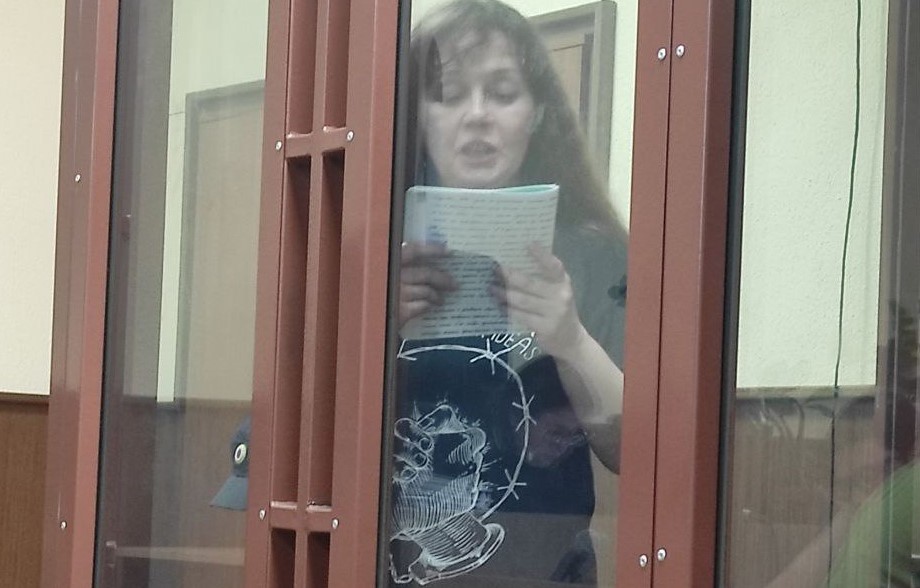
55-year-old Olga Smirnova, a Russian activist who has fearlessly spoken out against Russia’s persecution of Crimean Tatars, has been sentenced to six years’ imprisonment for criticizing Russia’s war of aggression against Ukraine. The artist, architect and founder of the Peaceful Resistance civic initiative was charged under one of the draconian additions to Russia’s criminal code rushed into law ten days after Russia launched its full-scale invasion of Ukraine. Article 207.3 § 2 b and d of Russia’s criminal code punishes for something claimed to be the ‘public circulation of knowingly false information about the Russian Federation armed forces’. By ‘knowingly false’ is meant information which does not correspond with the official position of the Russian defence ministry. According to this official position, Russia has not bombed residential buildings and hospitals, nor has it committed any of the other war crimes fully documented in Bucha, Kramatorsk, Izium and countless other Ukrainian cities.
The six-year sentence in a standard regime prison colony was passed on 30 August by 'judge' Natalya Petrova from the Kirovsky Court in St Petersburg, with Smirnova also banned from administering Internet resources for three years. The term of imprisonment was one year less than that demanded by state prosecutor, Burlakov, and will presumably include the 15 months, since 5 May 2022, that Olga has already spent in detention. The verdict and sentence will, of course, be challenged, but all such political sentences, aimed at silencing protest, have thus far been upheld.
Following Russia’s full-scale invasion of Ukraine, Smirnova posted a daily ‘War Chronicle’, organized; and held several anti-war protests; and openly expressed her opposition to the invasion. She and colleagues from Peaceful Resistance also maintained a page on VKontakte which had around 12 thousand subscribers before it was officially blocked on Russian-controlled territory on 21 March 2022.
On 5 May 2022, the so-called Centre for countering extremism and Investigative Committee carried out searches of the homes of five members of Peaceful Resistance: Olga Smirnova; Asan Mumdzhi; Vladimir Shipitsyn; Tatyana Sichkaryova and Ilya Tkachenko. All five were taken for interrogation, however Olga was the only person to be detained and charged under Article 207.3 § 2 (circulating ‘fakes’ about Russia’s armed forces)).
According to Net Freedoms, there were seven posts on the VKontakte page which mentioned:
- The turning of Ukrainian cities into ruins
- The victims of shelling of Zaporizhzhia; Kharkiv; Kyiv and Izium (in Kharkiv oblast);
- The fire at the Zaporizhzhia Nuclear Power Plant
- The shelling of the Memorial to the Victims of Babyn Yar in Kyiv
- The death of Mariupol residents during the storming of the city.
The texts are not available, and Net Freedoms points out that the trial material did not stipulate which particular expressions were deemed by the prosecution to constitute assertions of facts, nor their link with the actions of the Russian armed forces. The prosecution refused to carry out a linguistic assessment of the posts, with the assertion that the texts had been posted out of motives of political enmity basely solely on the ‘investigator’s’ interpretation. Olga denied the key charge that she had posted ‘fake information’. The prosecution also claimed that these expressed “an extremely negative attitude to the political regime of the Russian Federation”. She does not deny having such an attitude to the current regime, and said so in court. For the moment, there is no article of Russia’s criminal code punishing solely for such a negative attitude, although, in covert form, it figures in very many such political trials.
It was on the basis of seven posts on the social network VKontakte that the ‘investigator’ claimed in May 2022 that she needed to be in custody due to the ‘seriousness’ of the charges and the danger to the public of her ‘actions’ (social media posts).. Judges’ from the same Kirovsky district court allowed the remand application then and have continued extending her detention ever since. Olga’s lawyer, Maria Zyrianova was forced to sign a non-disclosure commitment during the preliminary investigation.
The trial itself began in July 2022, but was sent back to the prosecutor in October due to mistakes, and began again in December under a new judge.
According to Olga’s colleagues and friends, she began actively organizing and taking part in protests after Russia’s invasion of Crimea in 2014. She took part in single-person pickets in support of Russia’s ever-mounting number of Crimean Tatar and other Ukrainian political prisoners. For such entirely peaceful protest, she was constantly harassed and faced numerous administrative detentions, short periods in jail, fines, etc. Even before Russia’s full-scale invasion, it was clear that the regime was ramping up its persecution, and planning criminal charges, specifically over her defence of Crimean Tatar political prisoners. As reported, OMON riot police burst into her apartment on 20 October 2021 and carried out a search, removing computer equipment, hard drives, memory cards, as well as leaflets, a flag with the Ukrainian tryzub and the flag of the Mejlis, or self-governing body, of the Crimean Tatar people. It became clear that she was facing prosecution under Article 205.2 of Russia’s criminal code (so-called ‘public calls to carry out terrorist activities; public justification of terrorism or propaganda of terrorism’.
Russia is using ‘terrorism’ charges against members of the Crimean Tatar human rights movement. It has received international condemnation for such persecution, and all of its victims are recognized political prisoners. The attempt to accuse Olga Smirnova of ‘justifying terrorism’ when she was, in fact, pointing to the lack of any justification for such charges was immensely cynical. That would not, however, have stopped prosecutors and ‘judges’ from securing her conviction on those charges had Russia not launched its war of aggression against Ukraine and deployed other legislative weapons against those unwilling to remain silent.



